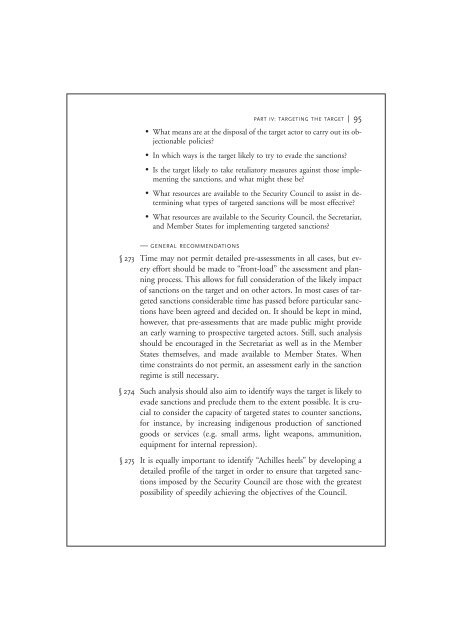Making Targeted Sanctions Effective - Small Arms Survey
Making Targeted Sanctions Effective - Small Arms Survey
Making Targeted Sanctions Effective - Small Arms Survey
Create successful ePaper yourself
Turn your PDF publications into a flip-book with our unique Google optimized e-Paper software.
PART IV: TARGETING THE TARGET | 95<br />
• What means are at the disposal of the target actor to carry out its objectionable<br />
policies?<br />
• In which ways is the target likely to try to evade the sanctions?<br />
• Is the target likely to take retaliatory measures against those implementing<br />
the sanctions, and what might these be?<br />
• What resources are available to the Security Council to assist in determining<br />
what types of targeted sanctions will be most effective?<br />
• What resources are available to the Security Council, the Secretariat,<br />
and Member States for implementing targeted sanctions?<br />
§ 273<br />
§ 274<br />
§ 275<br />
— GENERAL RECOMMENDATIONS<br />
Time may not permit detailed pre-assessments in all cases, but every<br />
effort should be made to “front-load” the assessment and planning<br />
process. This allows for full consideration of the likely impact<br />
of sanctions on the target and on other actors. In most cases of targeted<br />
sanctions considerable time has passed before particular sanctions<br />
have been agreed and decided on. It should be kept in mind,<br />
however, that pre-assessments that are made public might provide<br />
an early warning to prospective targeted actors. Still, such analysis<br />
should be encouraged in the Secretariat as well as in the Member<br />
States themselves, and made available to Member States. When<br />
time constraints do not permit, an assessment early in the sanction<br />
regime is still necessary.<br />
Such analysis should also aim to identify ways the target is likely to<br />
evade sanctions and preclude them to the extent possible. It is crucial<br />
to consider the capacity of targeted states to counter sanctions,<br />
for instance, by increasing indigenous production of sanctioned<br />
goods or services (e.g. small arms, light weapons, ammunition,<br />
equipment for internal repression).<br />
It is equally important to identify “Achilles heels” by developing a<br />
detailed profile of the target in order to ensure that targeted sanctions<br />
imposed by the Security Council are those with the greatest<br />
possibility of speedily achieving the objectives of the Council.
















